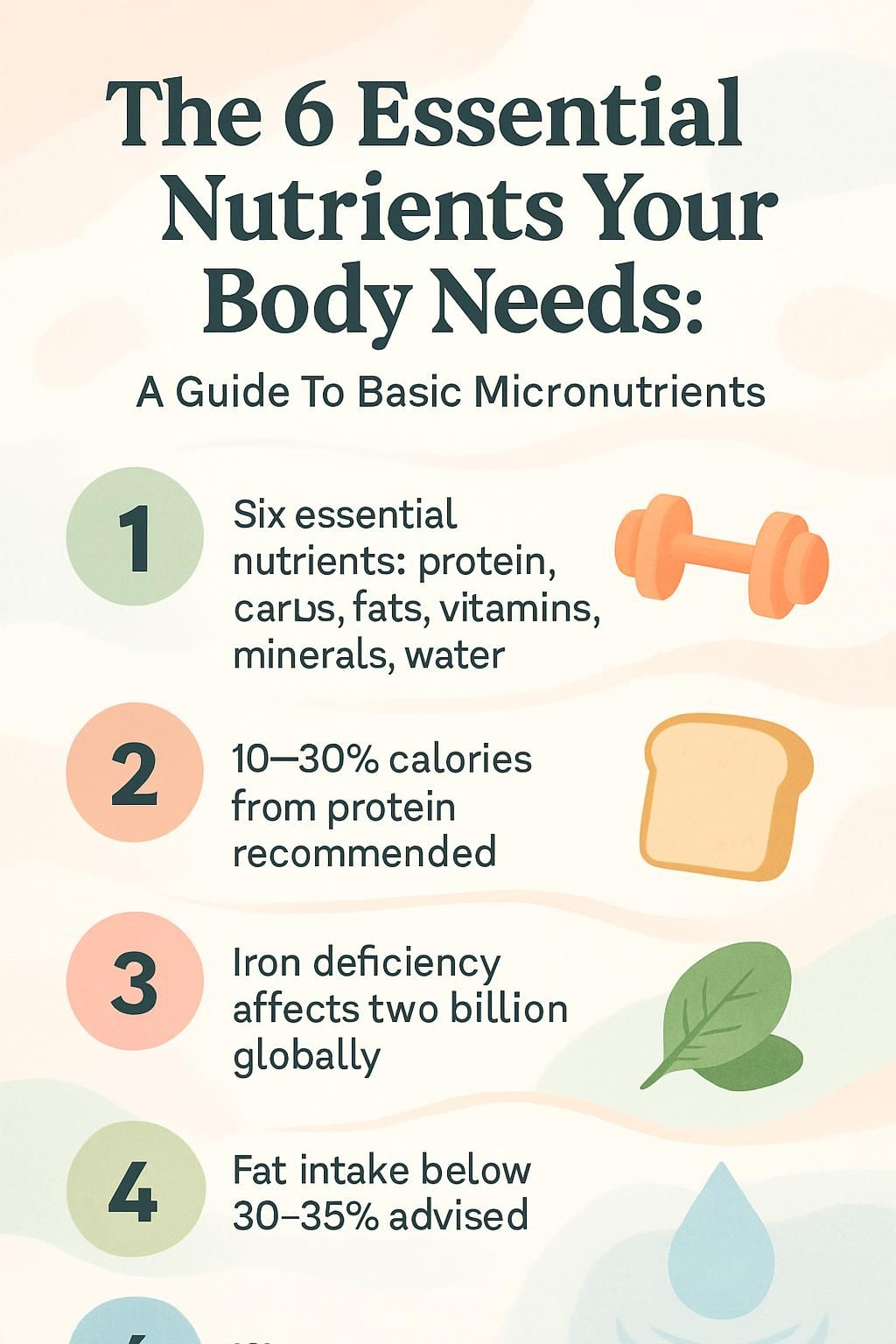The 6 Essential Nutrients Your Body Needs: A Guide To Basic Micronutrients
Our Nutrition Assistant AI Suite will transform your body. You will lose fat, get toned, and build muscle. Gain confidence and optimal health.
Sorting nutrition advice can feel overwhelming. The truth is simpler. Every cell in your body depends on the 6 essential nutrients to think clearly, move well, and stay healthy.
This guide explains each essential nutrient, where to find it in everyday foods like fruits and vegetables, whole grains, dairy, and lean meats, and why it matters at every age. You will also learn how small daily choices add up to strong health.
Use these tips to meet your goals without stress. Keep reading to learn what fuels your body best.
Key Takeaways
- Your body needs six essential nutrients, protein, carbohydrates, fats, vitamins, minerals, and water, for growth, energy, immunity, and overall health (World Health Organization).
- The Dietary Guidelines for Americans suggest 10–30% of calories from protein and 45–65% from carbohydrates to support daily activity and recovery.
- Deficiencies in iron, vitamin A, or vitamin D can lead to anemia, vision problems, or weak bones (CDC; peer-reviewed research).
- Choose mostly unsaturated fats from foods like fish, nuts, and plant oils while keeping total fat near 20–35% of daily calories (Dietary Guidelines for Americans; WHO).
- Even mild dehydration can cause headaches and fatigue. Hydration supports temperature control and nutrient transport (CDC).

Understanding Essential Nutrients

Essential nutrients are chemical substances in food that your body cannot make in sufficient amounts. They regulate basic functions, support your immune system, and keep you healthy day to day.
What are essential nutrients?
Nutrients are chemical substances your body uses to grow, repair, and function well. The six essential groups are protein, carbohydrates, fats, vitamins, minerals, and water. Your body cannot produce enough of these on its own.
You get them from many foods, such as milk, eggs, beans, grains, fruits, vegetables, fish, and meat. The Academy of Nutrition and Dietetics and the World Health Organization agree that these groups power energy production and help build and maintain tissues in the body.
Macronutrients include protein, carbohydrates, and fats. Micronutrients include vitamins and minerals, which you need in small amounts. Water supports every process, from digestion to temperature control.
Vitamins like vitamin A support your immune system. Minerals such as calcium strengthen bones and teeth. Growing up, our family meals always mixed several food groups, which made balanced eating feel simple.
You are what you eat highlights how a healthy diet affects your body functions but your nutrient needs can be unique due to genetics or health status.
How do essential nutrients affect your health?
These nutrients shape every part of health. Proteins repair tissues after exercise or injury. Carbohydrates provide energy for your brain and muscles. Fats, especially healthy unsaturated fats, form cell membranes and help make hormones.
Missing key vitamins or minerals can cause problems like iron deficiency anemia or weak bones from low vitamin D. Too little iodine may affect thyroid function. Balanced nutrition that includes all six groups is linked with lower risk of chronic disease in large research studies.
During a recovery last year, I noticed faster healing when I added foods rich in zinc, folate, and vitamin C. Food-first choices felt better than relying on supplements alone.
Getting the basics right supports immunity, healthy skin, strong muscles, steady digestion, and healthy pregnancy outcomes.
What Are the Six Essential Nutrients?
Six essential nutrients fuel energy and support growth and repair. Each group has a specific role in blood health, muscle strength, brain function, and more.
Which nutrients are vital for optimal health?
Your body needs both macronutrients and micronutrients. Each one plays a part in how you feel and function.
- Protein builds and repairs tissues, including skeletal muscle. Sources include eggs, fish, poultry, soy, and lentils.
- Carbohydrates supply energy for your cells, especially the brain and red blood cells. Choose whole grains, fruits, and vegetables for steady fuel.
- Fats help absorb fat-soluble vitamins A, D, E, and K. Favor monounsaturated and polyunsaturated fats from oils, nuts, avocados, and fatty fish.
- Vitamins support processes like vision, energy metabolism, and immunity. Examples include vitamin A, vitamin C, vitamin D, and the B vitamins.
- Minerals are inorganic elements needed for bones, oxygen transport, fluid balance, and nerve function. Calcium, iron, potassium, and zinc are key examples.
- Water makes up about 60 percent of body weight and supports digestion, temperature control, and waste removal.
- Dietary fiber, while not counted among the six, benefits gut health and blood sugar control. Beans, whole grains, fruits, and vegetables are good sources.
Each group works with the others. Up next, learn what protein actually does and where to find it.
Protein: What Does It Do and Where to Find It?
Protein builds and repairs tissues and keeps your cells working. Smart choices make it easy to meet your needs.
What are the main functions of protein in the body?
Protein is the building material for every cell. It supports growth, daily maintenance, and recovery. Proteins are made from amino acids. Nine of them are essential, which means you must get them from food like eggs, fish, lean meats, dairy, soy, and legumes.
Protein repairs muscles after workouts and supports skin, hair, and nails. Many hormones and enzymes are proteins. They help control metabolism and speed up digestion.
Combining plant foods, such as rice with beans, can provide all essential amino acids across your day. I noticed better recovery once I added a source of protein to each meal.
Each cell needs protein to function correctly; without enough quality dietary sources in your diet (nutrition), muscles weaken and healing slows down.
What foods are highest in protein?
Meeting the recommended 10% to 30% of daily calories from protein is easier when you choose from several groups.
- Eggs are complete proteins with all essential amino acids. One large egg has about 6 grams of protein plus vitamin B12 and choline.
- Chicken, turkey, beef, pork, and lamb are rich in protein. Three ounces of cooked chicken breast provide about 26 grams.
- Fish such as salmon, tuna, and cod deliver high-quality protein and useful omega-3 fats. A serving of tuna offers about 22 grams.
- Dairy foods like Greek yogurt, cottage cheese, and milk provide both casein and whey. One cup of cottage cheese can supply about 25 grams.
- Beans and lentils offer protein with fiber. A cup of cooked lentils provides roughly 18 grams along with folate and iron.
- Nuts and nut butters add protein and healthy fats. Two tablespoons of peanut butter supply around 8 grams.
- Combine legumes with grains for complete proteins if you avoid meat or dairy.
Next, see how carbohydrates keep your energy steady throughout the day.
Carbohydrates: How Do They Fuel Your Body?
Carbohydrates power your brain and muscles. Think of them as your body’s preferred fuel.
Why are carbohydrates important for energy?
Your body breaks down carbs into glucose, the main fuel in your blood. Glucose powers your brain, muscles, and organs. Extra glucose is stored as glycogen in the liver and muscles for later use.
Carbs help keep blood sugar steady when you choose them wisely. The Dietary Guidelines recommend 45% to 65% of calories from carbohydrates. Complex carbohydrates digest slowly, which limits spikes and crashes. Simple carbohydrates act faster and can cause swings if you eat them in large amounts.
What are the best sources of energy-boosting carbohydrates?
Choose carbohydrates that deliver steady energy and valuable nutrients.
- Whole grains like brown rice, oats, and quinoa release energy slowly and supply minerals such as magnesium and iron.
- Fruits provide natural sugars, fiber, and water-soluble vitamins like vitamin C and some B vitamins.
- Vegetables such as sweet potatoes, carrots, and corn add fiber and vitamins A and C for sustained energy.
- Beans and legumes, including lentils and chickpeas, offer complex carbs with protein, folate, iron, and zinc.
- Dairy foods like milk and yogurt contain lactose, a natural sugar that provides steady energy along with calcium.
- Limit refined grains and pastries that lack fiber and spike blood sugar quickly.
- Keep candy and sugary drinks to a minimum so you do not crowd out essential nutrients.
Nutrient-rich carbohydrates help balance both micronutrients and macronutrients. Next, learn which fats your body needs most.
Fats: Why Are They Important and Which Types Matter?
Fats build cells, make hormones, and help you absorb vitamins. The type of fat matters more than the total amount.
What types of fats are essential for health?
Unsaturated fats, which include monounsaturated and polyunsaturated fats, support heart health and cell function. Your body cannot make some of these essential fatty acids, so food sources are important. They also help you absorb vitamins A, D, E, and K.
Guidelines suggest 20% to 35% of total calories from fat, with most from unsaturated sources. These fats can help lower LDL cholesterol and support normal growth and development. Foods like avocados, nuts, salmon, olive oil, flaxseeds, and sunflower seeds are helpful choices.
After swapping processed snacks for walnuts and chia seeds, I felt more alert and steady through the afternoon. Saturated fats can fit in small amounts, yet too much may raise cholesterol over time.
- Favor unsaturated fats to support health.
- Top sources include plant oils, fish, nuts, and seeds.
- Essential fatty acids help tissues grow and repair.
- Keep saturated fat low to support healthy cholesterol.
What foods provide healthy dietary fats?
Choose fats that carry nutrients and protect your organs while keeping calories in check.
- Nuts such as almonds and walnuts provide unsaturated fats and vitamin E. Add a small handful to oatmeal or salads.
- Seeds like chia and flax deliver omega-3 fats that support heart and brain health.
- Fatty fish, including salmon and mackerel, supply long-chain omega-3s that help reduce inflammation.
- Avocados offer monounsaturated fats, fiber, and potassium.
- Olive oil is rich in monounsaturated fat and fits well in daily cooking.
- Canola and soybean oils provide polyunsaturated fats useful for energy balance and vitamin absorption.
- Eggs supply protein and helpful fats, making them a smart staple.
Getting fats from whole foods helps you meet your needs without relying on supplements. Ask a healthcare professional before using any supplement for specific deficiencies.
Vitamins: What Roles Do They Play and Where to Get Them?
Vitamins support countless reactions in your body. A varied plate is the simplest way to get enough.
How are vitamins classified?
Vitamins fall into two groups: fat soluble and water soluble. Vitamins A, D, E, and K are fat soluble, so your body can store them. Vitamin C and the B vitamins are water soluble, which means you need them more regularly because your body does not store them well.
Going without fat-soluble vitamins for a long time can deplete stores. Going without water-soluble vitamins affects you sooner since your body has limited reserves. This framework helps with diet planning and medical care.
Which vitamins are essential for health?
All vitamins play roles, yet some are especially well known.
- Vitamin A supports vision and immunity. Carrots and leafy greens are good sources.
- B vitamins, including B1 through B12, help convert food into energy and support nerves. Grains, meats, dairy, and legumes provide them.
- Vitamin C supports tissue repair and immune defenses. Citrus fruits and bell peppers are rich in it.
- Vitamin D helps build strong bones and supports immune function. Sunlight and fortified milk are common sources.
- Vitamin E protects cells from damage. Nuts and seeds supply it.
- Vitamin K is needed for normal blood clotting. Dark green vegetables like spinach provide it.
Next, explore which foods naturally supply these vitamins.
What natural foods contain key vitamins?
Whole foods deliver vitamins in combinations your body can use well. Aim for variety across the week.
- Leafy greens such as spinach and kale provide vitamin K and vitamin C in generous amounts.
- Oranges and strawberries are classic sources of vitamin C. One medium orange can cover most of your daily need.
- Fatty fish like salmon supply vitamin D and B vitamins that support bones and energy.
- Eggs provide vitamins D, B12, and A, along with protein.
- Dairy foods like milk and yogurt contain riboflavin and B12. Many milks are fortified with vitamin D.
- Colorful vegetables, including carrots, provide beta carotene that your body converts to vitamin A.
- Whole grains such as brown rice supply B vitamins like thiamine for energy metabolism.
- Lean meats like chicken offer niacin and vitamin B6 to support brain and nerve function.
Planning meals with a mix of these foods often reduces the need for supplements. A clinician may still advise targeted supplements if tests show a gap.
Minerals: Why Are They Necessary and What Are the Key Types?
Minerals help your body do essential jobs. Getting enough supports strong health at every age.
Why does the body need minerals?
Minerals build bones and teeth, steady your metabolism, and help control hydration. Calcium supports bone strength. Magnesium is involved in hundreds of reactions inside your cells.
Iron moves oxygen in your blood and helps prevent anemia, a condition that affects billions worldwide. Potassium supports muscle function and fluid balance. Without enough minerals, you may face weak bones, fatigue, or muscle cramps.
Choosing mineral-rich foods regularly is a simple way to protect your health.
What is the difference between major and trace minerals?
Major minerals are needed in larger amounts. These include calcium, phosphorus, potassium, sodium, chloride, and magnesium. The National Institutes of Health notes that adults generally need about 1,000 milligrams of calcium daily for bone health.
Trace minerals are required in smaller amounts. They include iron, zinc, iodine, chromium, copper, fluoride, molybdenum, manganese, and selenium. Even in tiny doses, they matter. Iron carries oxygen in blood, and zinc supports your immune system.
During my nutrition coursework, I adjusted my meals to include both types. Low iron and magnesium were behind my tiredness, and the change helped.
Which foods provide important minerals?
You can meet mineral needs with a balanced mix of plant and animal foods.
- Dairy products like milk, cheese, and yogurt supply calcium and often magnesium for bones.
- Meat and poultry provide iron and zinc for oxygen transport and immune support.
- Leafy greens such as spinach and kale deliver magnesium, potassium, iron, and calcium.
- Nuts and seeds add minerals, for example magnesium from almonds and zinc from pumpkin seeds.
- Whole grains like brown rice and oats add selenium, iron, and magnesium to meals.
- Beans and lentils bring extra iron and magnesium for energy and muscle function.
- Seafood, including salmon and oysters, offers iodine, selenium, and zinc. Many fish also contain vitamin D, which helps with mineral use.
- Use iodized salt if you rarely eat seafood to support thyroid health.
When I ate more greens from our garden and eggs from a local farm, my energy during sports noticeably improved.
Water: Why Is It Essential and How Can You Stay Hydrated?
Water supports every cell. Hydration keeps digestion, temperature, and circulation running smoothly.
Why does your body need water?
Water makes up about 60 percent of your body weight. The CDC notes that hydration cushions joints and nerves, regulates temperature, and helps your body clear waste.
Cells use water to transport nutrients and carry away byproducts. Staying hydrated can prevent headaches, fatigue, and constipation. Thirst, dark urine, or muscle cramps may signal that you need more fluids, especially during heat or exercise.
Knowing these signs helps you act before dehydration affects your focus and mood.
How can you recognize dehydration?
Learning the signs helps you respond early and feel better faster.
- Headaches, fatigue, or constipation can appear when fluid intake is low.
- Urine color is a helpful cue. Dark yellow suggests you need more water. Pale yellow or nearly clear suggests good hydration.
- Dry mouth or a sticky feeling often means you should drink.
- Dizziness when standing can occur as blood volume drops with fluid loss.
- Thirst is a late signal that mild dehydration has started.
- Urinating less often is a strong warning sign.
- Skin that does not bounce back quickly after a gentle pinch can indicate moderate dehydration.
- Muscle cramps or weakness may occur after heavy sweating without fluid replacement.
Spot symptoms early to prevent more serious problems with fluid balance.
What are effective hydration tips?
Simple habits keep hydration on track throughout the day.
- Make plain water your main drink to avoid extra sugar and calories.
- Sip water regularly instead of chugging large amounts at once.
- Use urine color as a guide. Aim for pale yellow most of the time.
- Choose low sugar drinks like herbal tea or diluted fruit juice if you want variety.
- Eat water-rich foods, such as cucumbers, watermelon, oranges, and lettuce.
- Hydrate before, during, and after exercise. Even a 2% fluid loss can affect performance.
- Keep a refillable bottle nearby to prompt frequent sips. This helped me during long study sessions.
- Increase fluids in hot weather or during illness to replace extra losses.
- Do not wait for thirst, especially for children and older adults.
- Track daily intake with a journal or app if goals are hard to meet.
How Do Micronutrients Impact Your Health?
Micronutrients, vitamins and minerals, protect your body against many problems. They support immunity, growth, and energy production.
How can vitamins and minerals prevent deficiencies?
Eating a variety of nutrient-dense foods helps prevent common deficiencies linked to serious health issues. For example, low iron can cause anemia, which leads to tiredness and poor focus. Too little vitamin A can affect vision. Low vitamin D can weaken bones in children and adults.
Meeting micronutrient needs reduces the risk of conditions like scurvy or rickets. If illness or a restrictive diet makes eating tough, a clinician may suggest specific supplements to fill gaps.
Next, see how micronutrients lift immunity and energy day to day.
How do micronutrients support immunity and energy?
Vitamins and minerals guide many reactions that power your immune system and energy pathways. Vitamin C supports white blood cells and wound healing. Selenium supports thyroid function, which influences energy levels.
B vitamins, vitamin D, zinc, iron, and copper help enzymes turn food into usable energy. After I added leafy greens for magnesium and citrus for vitamin C during winter, I noticed fewer colds and steadier energy.
How Can You Balance Macronutrients and Micronutrients?
Balancing the big nutrients with the small ones helps you feel your best. A simple plan beats strict rules.
Why is balanced nutrition important?
Balanced meals include the right amounts of macronutrients and micronutrients. Building plates from all five food groups, dairy, fruit, grains, protein, and vegetables, makes this easier.
Research links varied diets with lower risk of heart disease and diabetes. Adequate nutrition supports immunity, bone strength, healing, and stable energy. Deficiencies can lead to problems like anemia or osteoporosis.
Healthcare professionals often encourage a food-first approach. Supplements can help in specific cases but are not a shortcut to a healthy diet.
What strategies help achieve nutritional balance?
Use these practical steps to build balanced meals that fit your life.
- Include all five food groups in most meals to improve completeness.
- Rotate fruits, vegetables, grains, protein sources, and dairy choices across the week for diversity.
- Watch portions with tools like MyPlate or ask a registered dietitian for guidance.
- Limit highly processed foods high in saturated fats or added sugars.
- Schedule periodic check-ins with a registered dietitian for personalized advice.
- Drink enough water to support digestion and manage hunger cues.
- Track meals occasionally to spot nutrient gaps and wins.
- Adjust your intake during life stages such as childhood, pregnancy, or older adulthood with professional support.
After logging meals for two weeks, I noticed a calcium gap. Adding yogurt daily brought me back on track.
What Are Common Nutrient Myths and Facts?
Misleading claims can derail good intentions. Knowing the facts makes choices easier.
What myths exist about carbohydrates and fats?
The idea that all carbohydrates cause rapid weight gain is false. Complex carbohydrates like oatmeal and whole grain bread provide steady energy and help keep blood sugar stable.
Another myth says all fats are bad. In reality, unsaturated fats from olive oil, nuts, and avocados support heart health. Excess saturated fat is the main concern. I replaced butter with olive oil for most cooking and saw better cholesterol results after a few months.
Focus on quality sources rather than avoiding entire nutrient groups.
What is the truth about dietary supplements?
Supplements have a place, but food should come first. Whole foods offer vitamins, minerals, fiber, and other helpful compounds that pills cannot match.
Multivitamins may help if a test shows a deficiency or if your diet is very limited. A 2021 CDC report found that many adults use supplements, yet benefits depend on your individual needs and health status.
Work with your clinician to decide if you need more than food. When my energy lagged, testing showed low iron. An iron-focused meal plan with lentils and beef helped far more than a general vitamin.
Use supplements wisely and under professional guidance.
How Can You Ensure Adequate Nutrient Intake?
Good nutrition comes from simple routines. A little planning makes a big difference.
How to plan meals for sufficient nutrients?
Plan for variety and balance at each meal. Aim to cover the six essential nutrients and add fiber-rich foods for gut health.
- Fill your day with fruits and vegetables. Aim for at least five servings to boost vitamins, minerals, and fiber.
- Include lean proteins such as chicken, fish, tofu, or beans. Most adults need about 0.8 grams per kilogram of body weight daily.
- Add healthy fats from avocado, olive oil, nuts, and seeds. Favor unsaturated fats and avoid trans fats.
- Choose whole grains, like brown rice or whole wheat bread, for steadier energy and more fiber.
- Drink water with meals and snacks. Pale yellow urine usually signals good hydration.
- Rotate protein sources through the week to add different nutrients. Plant proteins also add fiber.
- Make half your plate fruits and vegetables at most main meals, a simple USDA-aligned habit that improved my own routine.
- Plan weekly menus that include foods rich in vitamins A, C, D, calcium, iron, magnesium, potassium, and zinc.
- Use a meal tracking app to spot gaps, such as too little dairy or too few greens.
- Rotate recipes often to boost dietary diversity and keep meals interesting.
These steps help you cover both macronutrients and micronutrients without overthinking every bite.
Why is dietary diversity important?
Dietary diversity lowers your risk of missing key nutrients. Different foods provide different vitamins and minerals. Whole grains offer energy and B vitamins. Leafy greens and citrus bring vitamin C and iron.
Studies link diverse diets with better health outcomes. Needs change for children, pregnant women, and older adults, so variety matters even more. I try one new fruit or vegetable every month to keep meals fresh and balanced.
How Do Nutritional Needs Change Through Life Stages?
Your needs change as you grow and age. Adjusting your diet helps you stay strong through each stage.
How should diet adjust for childhood, pregnancy, and older age?
Different life stages call for different nutrient priorities. Use this quick guide to aim your choices.
- Infants need only breast milk or iron-fortified formula for the first 6 months. Ask your pediatrician before starting solids.
- Children need all five food groups daily to support growth and brain development.
- Pregnant women need more iron and folate. Include lean meats, leafy greens, beans, and take prenatal vitamins under medical guidance.
- People who menstruate may need more iron. Consider foods like spinach, fortified cereals, and lentils.
- Adults over 65 need extra calcium and vitamin D. Choose dairy or fortified alternatives and get safe sunlight exposure.
- Hydration is crucial during pregnancy. Drink water consistently throughout the day.
- With age, appetite can drop. Choose nutrient-dense foods with B12, potassium, fiber, and healthy fats.
- Consult registered dietitians for personalized advice. My energy improved in my late twenties with professional guidance.
How to tailor nutrition for specific health conditions?
Medical conditions can change what and how you should eat. Targeted nutrition can reduce symptoms and protect health.
- Increase protein and calories during cancer-related weight loss to help maintain muscle.
- For swallowing problems, use moist, soft foods and purees to reduce choking risk.
- For malabsorption from conditions like celiac disease or Crohn’s disease, work with a dietitian to prevent deficiencies.
- In depression, simplify meal routines with ready-to-heat balanced options so you still meet nutrient needs.
- If you notice undernutrition signs like unplanned weight loss, add energy-dense snacks to prevent muscle breakdown.
- Watch hydration during vomiting or diarrhea. Aim for 8–10 cups daily or as advised.
- For chronic illnesses such as kidney disease or diabetes, schedule lab tests to monitor micronutrient status.
- Keep variety in your grocery list, including grains, fruits, vegetables, dairy alternatives, and lean proteins.
After my grandmother’s stroke, thickened liquids and soft foods helped her eat safely and meet calorie goals.
Conclusion
Meeting your essential nutrient needs supports energy, immunity, bones, and brain function. The six essential nutrients, protein, carbohydrates, fats, vitamins, minerals, and water, work together to keep you well.
Build most meals from whole foods like fruits and vegetables, whole grains, lean proteins, and dairy or fortified alternatives. Small, steady choices make a real difference at any age.
This article is for education and does not replace medical advice. If you have questions about your diet, talk with a healthcare professional or a registered dietitian.
FAQs
1. What are the six essential nutrients your body needs?
The six essential nutrients are carbohydrates, proteins, fats, vitamins, minerals, and water. Each plays a unique role in supporting growth, energy, and health. For example, carbohydrates provide energy, while minerals like calcium help build strong bones. Research from the Centers for Disease Control and Prevention shows that a balanced intake of these nutrients supports healthy body function.
2. Why are micronutrients important for health?
Micronutrients, such as vitamins and minerals, support many body processes including immune response and cell repair. Deficiencies can lead to serious health problems like anemia or weakened immunity. According to the World Health Organization, even small amounts of micronutrients are vital for good health.
3. How can I make sure I get enough essential nutrients every day?
Eating a variety of foods helps you meet your daily nutrient needs. Include whole grains, lean proteins like poultry or fish, fruits, vegetables rich in vitamins A and C, dairy products with calcium, and plenty of water in your meals. For example, after tracking my own diet using a food journal app last year, I noticed improvements in my energy when I added more leafy greens and nuts.
4. What happens if someone lacks one or more essential nutrients?
Lack of any essential nutrient may cause symptoms such as fatigue from low iron levels or muscle cramps due to not enough potassium. Long-term deficiencies increase risk for chronic diseases including osteoporosis or heart disease according to data published by the National Institutes of Health.
Summary: The six essential nutrients—carbohydrates; proteins; fats; vitamins; minerals; water—are all crucial for maintaining overall well-being. Eating diverse foods ensures proper intake; missing key nutrients can affect both short-term wellness and long-term health outcomes.







